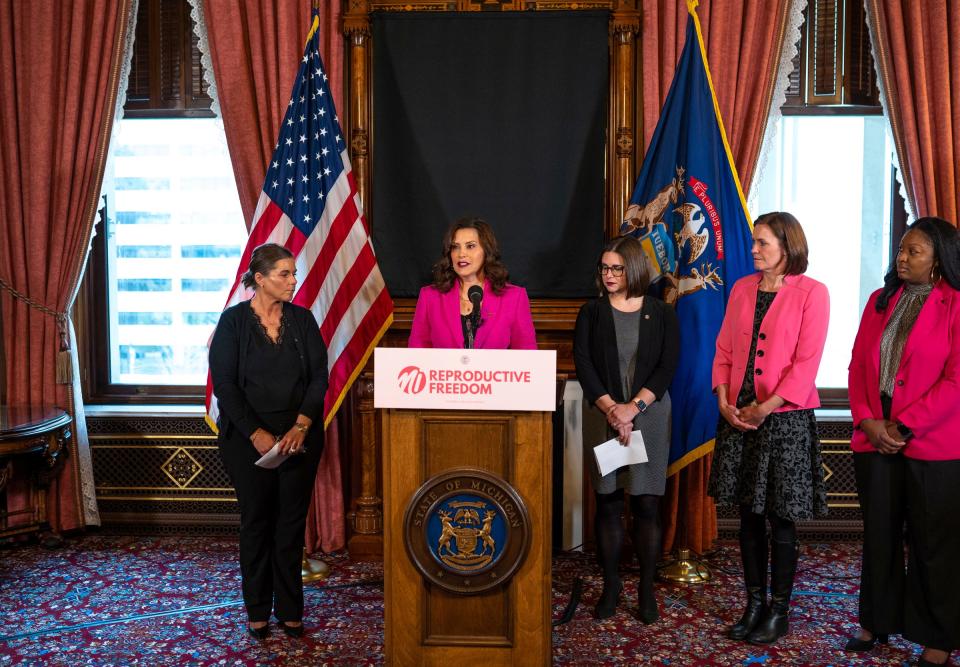Whitmer repeals abortion insurance law she fought against a decade ago
- Oops!Something went wrong.Please try again later.
LANSING — Exactly 10 years ago, Gov. Gretchen Whitmer shared for the first time publicly her own experience surviving sexual assault in hopes that it might dissuade Republicans from supporting a proposal requiring the purchase of a special insurance rider to cover abortions with no exceptions for rape or incest.
It didn't work. Every GOP lawmaker supported the legislation from the abortion rights opposition group Right to Life of Michigan. But on Monday amid the backdrop of a political landscape in Michigan transformed by Democratic control of the Legislature, Whitmer repealed the Michigan law.

The governor recalled the outpouring of support she received a decade ago after she shared she was raped, a story that didn't stop the new restriction on abortion access but she said marked a turning point in her fight on the issue. "I knew then, this fight was not over," she said in remarks Monday on the Senate floor at the Capitol, where she signed the final bill in a legislative package aimed at eliminating barriers to abortion.
With Whitmer's signature on House Bill 4949, Michigan has a new Reproductive Health Act that follows the successful 2022 ballot measure to enshrine the right to reproductive freedom in the state constitution after the U.S. Supreme Court overturned the landmark abortion rights case. Combined with other abortion-related laws she signed last month, the bill Whitmer signed Monday removes several abortion-related restrictions in place in Michigan, including the one Whitmer railed against 10 years ago.
As Senate Minority Leader in 2013, Whitmer stared down the initiative from Right to Life of Michigan that obtained enough voter signatures to come before lawmakers for consideration after then-Gov. Rick Snyder, a Republican, vetoed similar legislation. Abortion rights opponents circumvented Snyder's veto by using the initiative process, which only requires legislative approval. Michigan stands out nationally in allowing lawmakers to enact voter-initiated legislation without the approval of the governor or a majority of voters in a statewide election.
On the Senate floor in 2013, Whitmer delivered an emotional speech explaining her opposition to the voter-initiated legislation.
"This tells women that were raped and became pregnant that they should have thought ahead and bought special insurance for it. By moving forward on this initiative, Senate Republicans want to essentially require Michigan women to plan ahead and financially invest in health care coverage for potentially having their bodies violated and assaulted," she said.
She went on to share her story of being raped as a freshman in college.
"Over 20 years ago, I was a victim of rape, and thank God, it didn't result in a pregnancy, because I can't imagine going through what I went through and then having to consider what to do about an unwanted pregnancy from an attacker," she said. "If this were law then and I had become pregnant, I would not be able to have coverage because of this. How extreme? How extreme does this measure need to be?"
She is not the only Democratic lawmaker to share their own sexual assault experience as part of their fight to protect abortion rights. State Rep. Laurie Pohutsky, D-Livonia — who sponsored the House Bill 4949 signed by Whitmer — delivered a speech during her first term recounting a pregnancy scare after she was raped. Thinking back to that moment Monday, Pohutsky said, "I long for a day, when female elected officials do not have to open up their wounds on the chamber floor, to appeal to the humanity of our colleagues."

Whitmer reflected on her own experience sharing her story, calling it one of the most "depressing days" earlier this year to an audience gathered in Detroit for an International Women's Forum conference. "I didn't change a single vote," she said. The decision to share her personal story was last-minute and impromptu she said. "I've got two little girls at home and I'm going to fight," she remembers thinking at the time. She called her own parent after delivering the speech, ringing up her father before he learned about it in news stories.
While Whitmer didn't achieve the outcome she sought that day, the speech catapulted her onto the national stage.
In 2022, with the U.S. Supreme Court's decision to make abortion rights the purview of individual states, Whitmer again found herself in the middle of another big fight over the issue. She took legal action to prevent a 1931 law criminalizing abortion from going into effect before voters took action themselves, passing Proposal 3 to add an explicit right to abortion in the Michigan Constitution.
But Whitmer and abortion rights advocates said that job wasn't done, urging the passage of a Reproductive Health Act.
Michigan Laws: Whitmer signs institutional desecration bills, others
As Whitmer rallied support around the effort this fall, she heard from those with firsthand experience with Michigan's abortion restrictions. During a roundtable discussion hosted by Whitmer in a Birmingham coffee shop, abortion rights advocate and mother Clare Molnar told participants she had two abortions, one of which stemmed from a fetal abnormality that complicated the pregnancy and was ultimately covered by her insurance she said because of a technicality.

"If it hadn't been, it was a $36,000 bill," she said. "That's an insane amount of money for anyone, including someone like me with relative financial privilege."
Last month, Whitmer repealed some abortion restrictions, including regulations for clinics that abortion rights advocates characterize as onerous and a state law banning higher education institutions' pregnant and parenting services offices from providing referrals for abortion services.
In addition to eliminating the requirement to purchase an insurance rider to cover abortions, the bill Whitmer signed Monday repeals other laws, including one requiring the state health department to prioritize funding for family planning services to entities that don't provide abortion care.
While Whitmer earlier called on lawmakers to repeal Michigan's 24-hour waiting period for those seeking abortions and a ban on Medicaid funding for the procedure, Democrats didn't have enough votes to do so.
Contact Clara Hendrickson: chendrickson@freepress.com or 313-296-5743. Follow her on X, previously called Twitter, @clarajanehen.
This article originally appeared on Detroit Free Press: Gov. Whitmer repeals Michigan abortion insurance law: What it means

